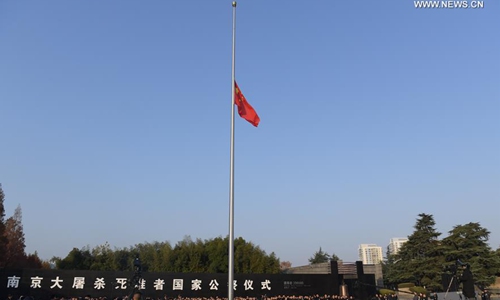HOME >> CHINA
Nation observes Nanjing Massacre amid calls for peace
By Zhang Hui Source:Global Times Published: 2019/12/13 19:48:40

China's national flag flies at half-mast during a national memorial ceremony to commemorate the victims of the Nanjing Massacre at the memorial hall for the massacre victims in Nanjing, east China's Jiangsu Province, Dec. 13, 2019. Photo: Xinhua
The memorial ceremony for Nanjing Massacre victims began peacefully across China on Friday, with no public display of hatred toward Japan as in previous years, which experts believe shows Chinese people's openness and growing rationality amid China's development.
China held a national memorial ceremony on Friday to mourn the 300,000 victims of the Nanjing Massacre by Japanese invaders in 1937. At 8 am, soldiers raised the national flag at half-mast at the Memorial Hall of the Victims in Nanjing Massacre by Japanese Invaders in Nanjing, East China's Jiangsu Province. Pigeons were released over the hall.
Then sirens howled over Nanjing city, drivers parked cars and sounded their horns, and pedestrians paused and stood in silent tribute.
A series of other activities nationwide were held on Friday, including the lighting of candles, and patriotic education in schools and for the public. Overseas Chinese communities are also expected to host memorial activities.
Friday marks China's sixth "National Memorial Day for Nanjing Massacre Victims."
Posts mourning the victims flooded Chinese social media on Friday, and related topics on Weibo had drawn over 12 billion views as of press time.
Unlike previous memorials when some netizens expressed hatred toward Japan and provoked confrontations between China and Japan, Chinese netizens this year launched online memorial activities in a rational manner, with many calling for others to cherish peace and remember history.
"We wish the world will have no more wars, and that the peaceful sunlight will spread across the world," the memorial hall's Weibo account posted, receiving many likes.
Li Haidong, a professor at the China Foreign Affairs University's Institute of International Relations, told the Global Times that the change in attitude to the incident shows that non-governmental communications between China and Japan this year, such as on trade and tourism, have boosted bilateral ties and mutual understanding of people of the two countries.
Netizens' feelings toward Japan may be an important index to test Chinese people's confidence, and with the development of the country, more Chinese people are more open and calm, and will see history issues from more reasonable perspectives, Zhang Yiwu, a professor at Peking University, told the Global Times.
The memorial activities were held amid warming of China-Japan relations this year. Later this month, a China-Japan-South Korea leaders' meeting will be held in Chengdu, Southwest China's Sichuan Province, and Japanese Prime Minister Shinzo Abe will attend. The meeting aims to improve bilateral cooperation and promote regional and world peace, stability and development.
Chinese President Xi Jinping accepted in principle an invitation from Japanese Prime Minister Shinzo Abe to visit Japan as a state guest next spring. The invitation was made during a meeting ahead of the Group of 20 (G20) summit in June.
The improved bilateral ties are the result of the two countries seeking mutual interests on regional cooperation and maintaining regional and global stability and prosperity, and the trade war launched by the US has also pushed China and Japan closer, Li said.
As the US launched trade wars with the rest of the world, Japan has started to reflect on its previous relations with the US, in which it was subservient to the US. China and Japan need each other to explore greater economic space, experts said.
The deepened cooperation of the world's second and third largest economies amid the US trade war is significant to the stability of the world economy, experts said.
On December 13, 1937, Japanese troops occupied Nanjing, China's capital at the time, and began more than 40 days of slaughter. In total, 300,000 civilians and unarmed Chinese soldiers were brutally murdered, and over 20,000 women were raped.
Liu Xin contributed to this story
Posted in: SOCIETY